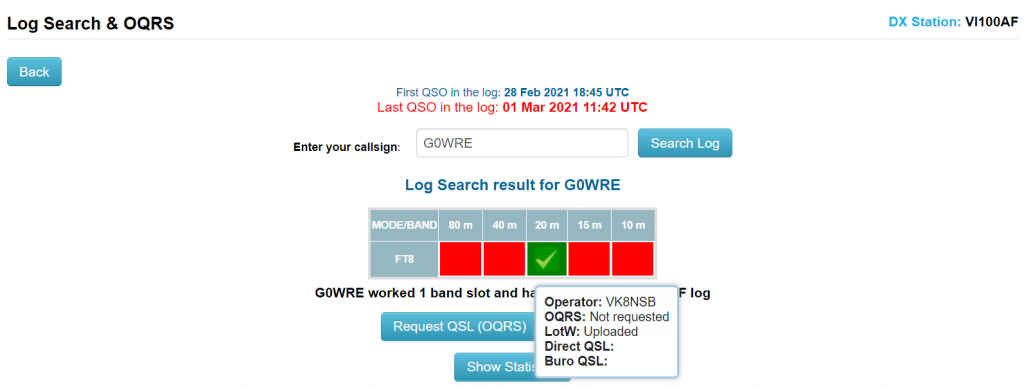Thanks to VK8NSB Stuart for working with the RAAF to get full permission to use the images for the VK /VI100AF in celebration for the 100 years of the Australian Air Force. The QSL card has been professionally designed by Max ON5UR. The QSL is now in print and we expect to have the QSL available in a a few weeks time for dispatch.
Each QSO report label will show the operator call sign that you worked.


Archive - March 2021
Brazil QSL Bureau parcel that we sent last year to the new PY address has been returned endorsed “UNCLAIMED”
I would like to express my gratitude to LABRE for solving this matter very quickly this week. Today i received the following letter from LABRE:
“Dear Tim Beaumont,
LABRE comes by means of this, to clarify some problems faced by you in sending cards QSL for Brazil.
In March 2014, LABRE transferred the management and treatment of cards coming from abroad to the São Paulo branch, and in that time, the national administration did not inspect or as the
work was being done. In 2020, there was a change in the entire Board of Directors, and we opted for the return of QSL’s management to Brasília, at the address that is currently on the IARU website https://www.iaru.org/reference/qslbureau-2/
Regarding the emails sent by you, we do not know the reason for the non-response because they did not arrive to us, we ask for your understanding and request that you use the email secretaria@labre.org.br to deal with
any matter with LABRE.
We emphasize that there was also a failure of communication between the Brazilian postal service and LABRE, as we did not receive reports that there were packages awaiting payment of taxes for the
completion of submission.
We are also surprised by this occurrence, as we have received several cards from other countries usually. In view of these occurrences, we have adopted the procedure of consulting weekly for
possible remittance from abroad, and with that we hope to eliminate the problems caused.
We sincerely apologize for the inconvenience caused and here we reinforce our longing for receive the cards that unfortunately returned.”
Dear LABRE,
I would like to express my gratitude to LABRE for solving this matter very quickly this week.
I have updated my website blog and added the letter very kindly sent to me by you today.
As far as i am concerned the matter is now resolved, any further loss of mail will be reported directly to you in future.
Regarding the emails, there were many email, and i got the email addresses from the LABRE Website which were obviously incorrect and have now been removed from the LABRE website. So maybe the website was not up to date? I also confirmed the email address with IARU which also gave me the wrong email address for LABRE. Again this matter is now resolved. I will be posting this parcel again to you for your members using “Printed Media Business Mail”
Some of the parcels i had sent to you in 2019 and 2020 that got returned were returned because of the new worldwide Pre Advice Delivery Data that is requested by Customs, Duane. Personal Correspondents such as QSL cards are EXEMPT from these new regulations, but Brazil Duane / Customs do not recognize the parcels as Personal Correspondents and return the parcels to sender. This was what the contents of my previous emails to ask for help from LABRE to allow these QSL parcels through customs / duane. So that was just for your information to help you understand why some of your parcels are required to pay TAX, this is because of the new worldwide Pre Advice Data for parcels, but there should be no TAX to pay on personal correspondents like QSL cards.
Once again, thank you for your co-operation and help. Please stay safe in these difficult covid times.
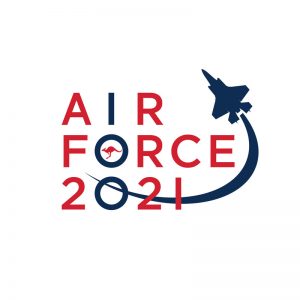 From our modest beginnings in 1921, Air Force has grown into a potent, World class Air Force which Australia relies upon in both conflict and peace. The men and women of the Royal Australian Air Force have achieved great success in serving Australia and its national interest over the past 100 years.
From our modest beginnings in 1921, Air Force has grown into a potent, World class Air Force which Australia relies upon in both conflict and peace. The men and women of the Royal Australian Air Force have achieved great success in serving Australia and its national interest over the past 100 years.The RAAF was formed on 31st March 1921, to mark this Centenary the Wireless Institute of Australia (WIA) will be celebrating with two call signs:
VI100AF 1st March 2021 to 29th May 2021 will be used by Radio Amateurs that are either current or veteran military personnel and some activities may be from military bases.
Stuart Birkin. VK8NSB will be organizing the event that will be aired by many Radio Amateurs across Australia as we celebrate this centenary with you. A team of 40+ operators across Australia will be operating over the next few months.
If you see a ”Not in Log” suggest you check in 3-4 days as logs are only updated every couple of days after each of the 46 operators completes their stint. The log is NOT live.
So… if you work the call today your QSO may NOT appear in the log for 3 or 4 days.
QSL Information: A commemorative 4-sided QSL will be printed for direct QSL requests.
QSL will show the operator call sign worked for each QSO.
OQRS Link for Direct & Bureau QSL VI100AF:
https://www.m0urx.com/oqrs/logsearch.php?dxcallsign=VI100AF
OQRS Link for Direct & Bureau QSL VK100AF:
https://www.m0urx.com/oqrs/logsearch.php?dxcallsign=VK100AF
Direct: QSL $2 Via M0URX
Bureau: Please only use OQRS. No Bureau route for incoming Bureau
LoTW: Will be uploaded with grid locator, state and zones for each operator.
For more information about Air Force 100: https://airforce2021.airforce.gov.au/
WIA info: https://www.wia.org.au/
 The year 2020 was certainly a different time for DXing. With fewer DXpeditions, you tuned the bands looking for the elusive ATNOs and band fills. FT8 continued to get traction and LoTW continues to garner new users.
The year 2020 was certainly a different time for DXing. With fewer DXpeditions, you tuned the bands looking for the elusive ATNOs and band fills. FT8 continued to get traction and LoTW continues to garner new users.
Looking back, OQRS continues to be the tool of choice for DXpedition QSLing and automation now plays a big role in QSL card processing. As more of you become confident about the security of requesting your QSL cards using The Bespoke Online QSL Request System, our team have worked throughout the year to improve its functions to both DX’ers and DXpedition teams.
As ham radio continues its march into the 21st century, i.e., the integration of computers in and around the ham shack, electronic and cloud logging, LoTW, eQSL, Remote Ham Radio, remote personal stations, etc., so does technology enter the realm of QSL management and the postal system.
OQRS is a “service” and almost all DX-peditions have moved to OQRS, but even services have a cost. Automation drives productivity, by using an OQRS system that’s optimized for automation and cost reduction QSL managers become more efficient. QSL duties can easily be executed by just one person to do the work. Manual handling of incoming envelopes is labour intensive, wastes paper and is an environmentally bad idea. Thankfully very few people these days choose to request their QSL via post or bureau, instead they use the OQRS.
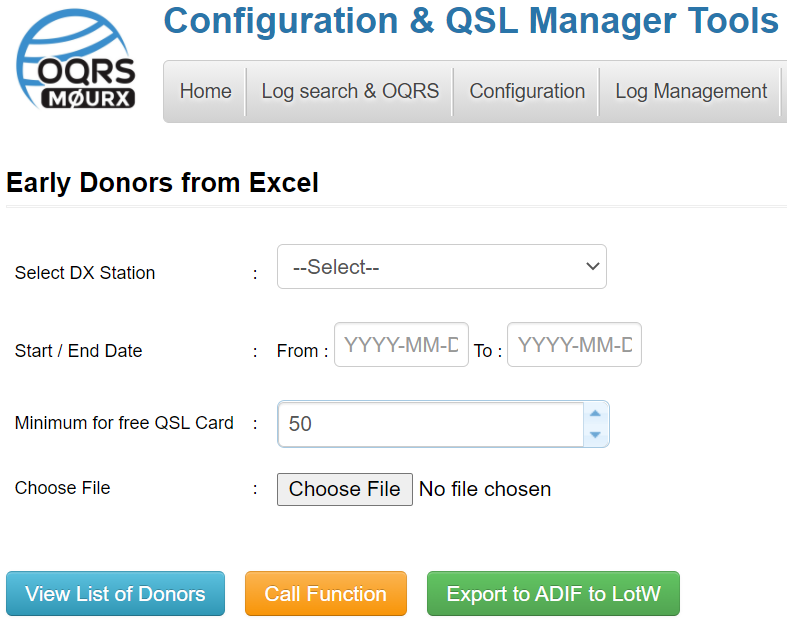 Donor Management: As the cost of DXpeditions rise, teams must find ways to cover their upfront costs. Many teams now recognize “early donors” with expedited QSLs, early LoTW, and other recognition methods. Our Bespoke Online QSL Request System is optimized to handle early recognition programs by accepting donor information from several different sources.
Donor Management: As the cost of DXpeditions rise, teams must find ways to cover their upfront costs. Many teams now recognize “early donors” with expedited QSLs, early LoTW, and other recognition methods. Our Bespoke Online QSL Request System is optimized to handle early recognition programs by accepting donor information from several different sources.
This function is very important to most DXpeditions, as they often have a huge list of donors that they ask us to send a direct QSL and send an Express LoTW upload. By collating the donation data from PayPal or from direct user input, we can upload donor data directly into OQRS which populates the QSL direct, address and LoTW fields on OQRS for the QSOs for those donors. To do this manually for several thousand call signs would be a huge task, this way the OQRS and LoTW can be updated in seconds.
OQRS Configuration: DXpedition teams establish their own QSL policy, the QSL manager manages the process. Generally, each team will want something different, whether that be a varying cost of the QSL exchange or a variation of Direct, Bureau or LoTW combinations. This we do by providing configuration options for our OQRS system.
 Express LoTW: Some DXpeditions often consider using the Express LoTW mode within our QSL request options. This does not replace other QSL methods, but does offer the DXer an early LoTW without receiving a QSL card. More and more DXers are asking for this option as the QSL card itself isn’t important to them. Our OQRS system processes Express LoTW requests daily and sends the Qs to LoTW. This option was added by request of the DX chasers not by the DXpeditions teams but both get something out of it.
Express LoTW: Some DXpeditions often consider using the Express LoTW mode within our QSL request options. This does not replace other QSL methods, but does offer the DXer an early LoTW without receiving a QSL card. More and more DXers are asking for this option as the QSL card itself isn’t important to them. Our OQRS system processes Express LoTW requests daily and sends the Qs to LoTW. This option was added by request of the DX chasers not by the DXpeditions teams but both get something out of it.
Statistics: On hand for the QSL manager we also have an extensive Statistics page for each call sign. This can be provided upon request by the DXpedition for their analysis.
Batch Bureau ADIF Request: Many expeditions also ask us to provide early Buro QSLs to members of a Foundation or Radio Society in return for a large donation to the DXpedition. This is provided by a single “Standard ADIF” file from the Foundation which we can process as a “Batch Bureau ADIF Request” which adds the society to the “QSL Via” field and we can then print out the labels and send the final QSL cards direct to the Foundation HQ for distribution as a thank you for the donation.
SWL: Is still a very important part of Amateur Radio despite the migration of the broadcast stations on shortwave. A large number of SWL requests are received for every DXpedition and these are managed by email, once verified can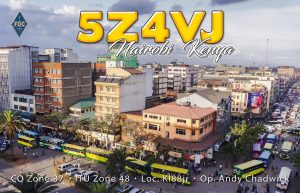 be added to the OQRS using “Add New QSO” function on the ADMIN tools. The SWL QSL is then queued ready for the next label print run. I do now ask if you are a SWL please provide 3 consecutive QSO’s worked by the DX so that i can more easily verify your QSL. The integrity of the SWL program is important to me.
be added to the OQRS using “Add New QSO” function on the ADMIN tools. The SWL QSL is then queued ready for the next label print run. I do now ask if you are a SWL please provide 3 consecutive QSO’s worked by the DX so that i can more easily verify your QSL. The integrity of the SWL program is important to me.
The advantages to the DXer to use OQRS should be obvious for all to see. You can be sure that all your QSO’s are safely in the log, accurately requested and processed by upstream systems.
Not in Log: E-mails, e-mails and more e-mails are a huge challenge for QSL managers. It’s not unusual for a QSL manager to get tens of hundreds of e-mails about Not in Log or busted calls. Typically, the e-mails contain screenshots, log entries, or long explanations. It takes an incredible amount of time to sort through the e-mails and understand the issue.
Our Bespoke OQRS system provides you with the “Not in log” form. This form is sent to my work queue where I can investigate logging issues directly in OQRS. This saves me having to wade through endless lines of unwanted text, images and logs in the e-mails. I can fix the issue send a reply to the claimant and on to the next enquiry.
One request is allowed for the same station and for the same DXpedition log. The best practice is if not in log then work again or wait for the end of operation before completing and sending the log check request form.
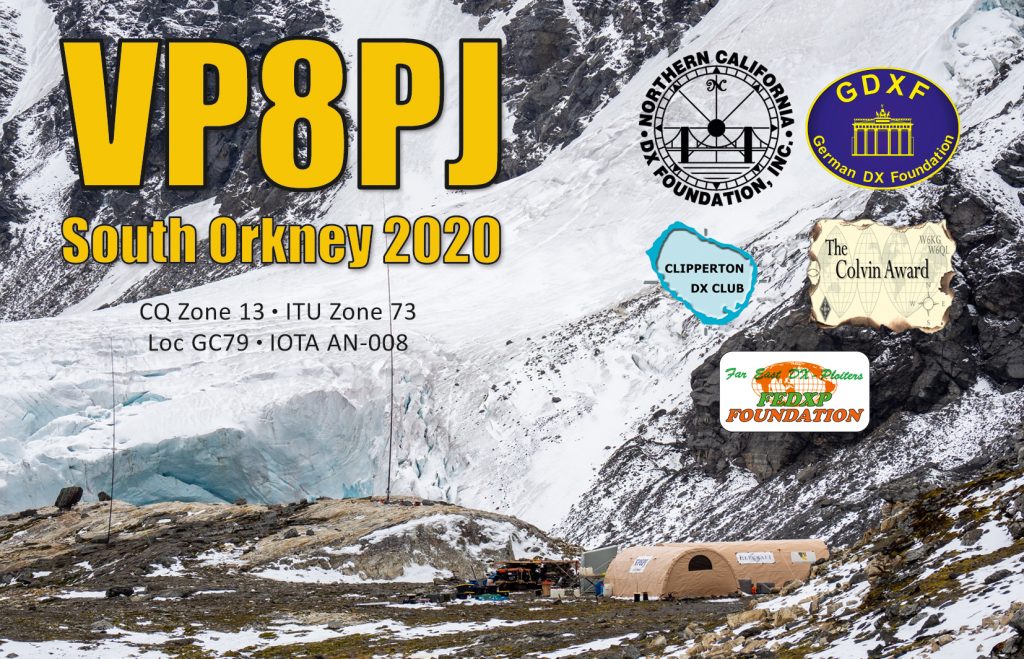 Working with teams like the Perseverance DX Group (PDXG) has enabled me to guide my QSL management development to streamline the OQRS processes and make every process quicker, more accurate and secure.
Working with teams like the Perseverance DX Group (PDXG) has enabled me to guide my QSL management development to streamline the OQRS processes and make every process quicker, more accurate and secure.
Automation of the QSL process comes at a small cost of course so it is not free. Hiring professional programmers, hosting applications and server and software maintenance each come with a cost. I also invest in computer hardware, replace printers regularly, toner, card, envelopes, storage, and bureau expenses.
With automation of the QSL process and our seamless integration with the postal system we minimize expenses by using pre-sort, printed postage, and standard size envelopes.
As we’re seeing in our everyday life, electronic communications have greatly reduced the amount of paper we receive in the mail. Handling incoming QSL cards, non-standard envelopes, foreign currency and even IRCs actually adds cost and slows the process. I even receive “used” stamps (cancelled) which can never be reused. Our international mailing contract ensures that our teams get the very best postal rates.
When we receive a direct mailed request with insufficient return postage a decision will be made on the returned QSL. It might go direct at the DXpedition’s expense, or it might go back through the Buro. Each situation is reviewed and handled differently.
So, the march to seamless automation and the integration of disparate systems continues in your day-to-day life and in our world of QSL management.
Please contact me if you have any questions about our service or the Bespoke QSL Management System.
The Royal Australian Air Force – 100 Year Centenary. VK100AF & VI100AF
Since both VI100AF & VK100AF hit the airways on 1st March 21, 18 of the 46 operators have now used the VI100AF callsign for a total of 4661 QSO’s. 12 of the 46 operators have used the VK100AF callsign for a total of 3612 QSO’s. The bands have not been the best, but the operators are working hard to ensure that they are active as much as possible during their allocated period with the specified callsign. Log books are uploaded to OQRS & LoTW the day after each operators allocated time, so please if you see a ” Not in Log ” , try again in a few days’ time, but in the meantime work the station again if you’re not 100% sure of the QSO. The QSL Card is now being finalised with the designer and will be at the printers very soon, we expect to be sending the QSL card out in late April.
QSL Information: A commemorative 4-sided QSL will be printed for direct QSL requests.
OQRS Link for Direct & Bureau QSL VI100AF:
https://www.m0urx.com/oqrs/logsearch.php?dxcallsign=VI100AF
OQRS Link for Direct & Bureau QSL VK100AF:
https://www.m0urx.com/oqrs/logsearch.php?dxcallsign=VK100AF
Direct: QSL $2 Via M0URX
Bureau: Please only use OQRS. No Bureau route for incoming Bureau
LoTW: will be uploaded.
73, Stuie VK8NSB, Station Manager VI100AF & VK100AF
Welcome to Berry PJ4BZL in Bonaire to the United Radio QSL Bureau. Berry is mostly active on FT8 mode. QSL is now being printed and will be available shortly.
The log has been uploaded to LoTW.
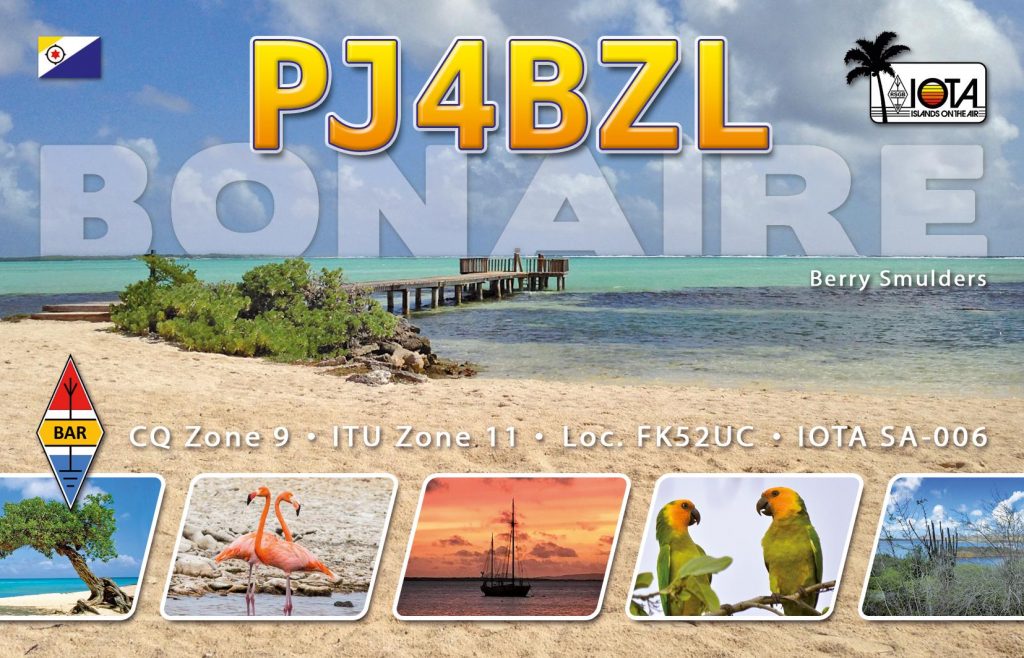
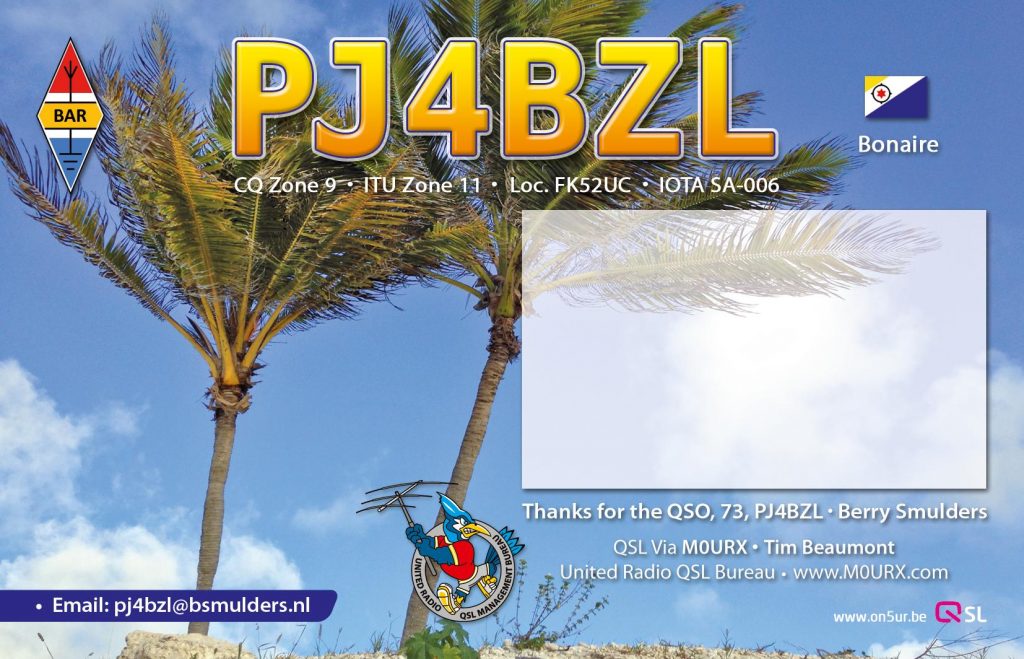
VI100AF & VK100AF logs will be uploaded to OQRS as the operators send me updates. So there maybe other operator logs still to be updated. Please do not send inquiries about missing or busted Qs at this time. Please wait until all logs are in for the week.
You can check on the OQRS Log Search to see who the operator was by hovering the mouse over the QSO. Over 40 VK operators are involved in this Special Event Station from all States.
